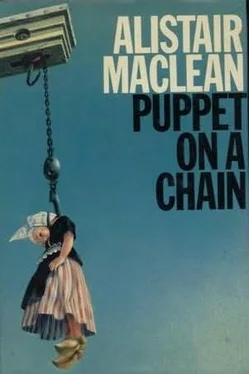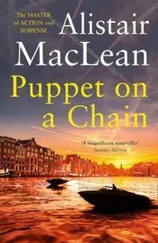De Graaf took the puppet from Muggenthaler and gazed at it. 'Beautiful,' he murmured. 'How beautiful. And how real, how living. This lives.' He glanced at Muggenthaler. 'Would you have any idea who made this puppet?'
'I've never seen one like it before. It's not one of ours, I'm sure, but the floor foreman is the man to ask. But I know it's not ours.'
'And this exquisite colouring,' de Graaf mused. 'It's so right for the face, so inevitable. No man could have created this from his own mind. Surely, surely, he must have worked from a living model, from someone he knew. Wouldn't you say so, Inspector?'
'It couldn't have been done otherwise,' van Gelder said flatly.
'I've the feeling, almost, that I've seen this face before,' de Graaf continued. 'Any of you gentlemen ever seen a girl like this?'
We all shook our heads slowly and none more slowly than I did. The old leaden feeling was back in my stomach again but this time the lead was coated with a thick layer of ice. It wasn't just that the puppet bore a frighteningly accurate resemblance to Astrid Lemay: it was so lifelike, it was Astrid Lemay.
Fifteen minutes later, after the thorough search carried out in the warehouse had produced its predictably total negative result, de Graaf took his farewell of Muggenthaler and Morgenstern on the steps of the warehouse, while van Gelder and I stood by. Muggenthaler was back at his beaming while Morgenstern stood by his side, smiling with patronizing satisfaction. De Graaf shook hands warmly with both in turn.
'Again, a thousand apologies.' De Graaf was being almost effusive. 'Our information was about as accurate as it usually is. All records of this visit will be struck from the books.' He smiled broadly. 'The invoices will be returned to you as soon as certain interested parties have failed to find all the different illicit diamond suppliers they expected to find there. Good morning, gentlemen.'
Van Gelder and I said our farewell in turn and I shook hands especially warmly with Morgenstern and reflected that it was just as well that he lacked the obvious ability to read thoughts and had unluckily come into this world without any inborn ability to sense when death and danger stood very close at hand: for Morgenstern it was who had been at the Balinova night-club last night and had been the first to leave after Maggie and Belinda had passed out into the street.
We made the journey back to the Marnixstraat in partial silence, by which I mean that de Graaf and van Gelder talked freely but I didn't. They appeared to be much more interested in the curious incident of the broken puppet than they were in the ostensible reason for our visit to the warehouse, which probably demonstrated quite clearly what they thought of the ostensible reason, and as I hardly liked to intrude to tell them that they had their priorities right, I kept silent. Back in his office, de Graaf said: 'Coffee? We have a girl here who makes the best coffee in Amsterdam.'
'A pleasure to be postponed. Too much of a hurry, I'm afraid.'
'You have plans? A course of action, perhaps?'
'Neither. I want to lie on my bed and think.'
Then why — '
'Why come up here in the first place? Two small requests. Find out, please, if any telephone message has come through for me.'
'Message?'
'From this person I had to go to see when we were down in the warehouse.' I was getting so that I could hardly tell whether I was telling the truth or lying.
De Graaf nodded, picked up a phone, talked briefly, wrote down a long screed of letters and figures and handed the paper to me. The letters were meaningless: the figures, reversed, would be the girls' new telephone number. I put the paper in my pocket.
'Thank you. I'll have to decode this.'
'And the second small request?'
'Could you lend me a pair of binoculars?'
'Binoculars?'
'I want to do some bird-watching,' I explained.
'Of course,' van Gelder said heavily. 'You will recall, Major Sherman, that we are supposed to be co-operating closely?'
'Well?'
'You are not, if I may say so, being very communicative.'
'I'll communicate with you when I've something worth communicating. Don't forget that you've been working on this for over a year. I haven't been here for two days yet. Like I say, I have to go and lie down and think.'
I didn't go and lie down and think. I drove to a telephone-box which I judged to be a circumspect distance from the police headquarters and dialled the number de Graaf had given me.
The voice at the other end of the line said: 'Hotel Touring.'
I knew it but had never been inside it: it wasn't the sort of hotel that appealed to my expense account, but it was the sort of hotel I would have chosen for the two girls.
I said: 'My name is Sherman. Paul Sherman. I believe two young ladies registered with you this morning. Could I speak to them, please?'
'I'm sorry, they are out at present.' There was no worry there; if they weren't out locating or trying to locate Astrid Lemay they would be carrying out the assignment I'd given them in the early hours of the morning. The voice at the other end anticipated my next question. 'They left a message for you, Mr Sherman. I am to say that they failed to locate your mutual friend and are now looking for some other friends. I'm afraid it's a bit vague, sir.'
I thanked him and hung up. 'Help me,' I'd said to Astrid, 'and I'll help you.' It was beginning to look as if I were helping her all right, helping her into the nearest canal or coffin. I jumped into the police taxi and made a lot of enemies in the brief journey to the rather unambitious area that bordered on the Rembrandtplein.
The door to Astrid's flat was locked but I still had my belt of illegal ironmongery around my waist. Inside, the flat was as I'd first seen it, neat and tidy and threadbare. There were no signs of violence, no signs of any hurried departure. I looked in the few drawers and closets there were and it seemed to me that they were very bare of clothes indeed. But then, as Astrid had pointed out, they were very poor indeed, so that probably meant nothing. I looked everywhere in the tiny flat where a message of some sorts could have been left, but if any had been, I couldn't find it: I didn't believe any had been. I locked the front door and drove to the Balinova night-club.
For a night-club those were still the unearthly early hours of the morning and the doors, predictably, were locked. They were strong doors and remained unaffected by the.hammering and the kicking that I subjected them to, which, luckily, was more than could be said for one of the people inside whose slumber I must have so irritatingly disturbed, for a key turned and the door opened a crack.
I put my foot in the crack and widened it a little, enough to see the head and shoulders of a faded blonde who was modestly clutching a wrap high at her throat: considering that the last time I had seen her she had been clad in a thin layer of transparent soap bubbles I thought that this was overdoing it a little.
'I wish to see the manager, please.'
'We don't open till six o'clock.'
'I don't want a reservation. I don't want a job. I want to see the manager. Now.'
'He's not here.'
'So. I hope your next job is as good as this one.'
'I don't understand.' No wonder they had the lights so low last night in the Balinova, in daylight that raddled face would have emptied the place like a report that one of the customers had bubonic plague. 'What do you mean, my job?'
I lowered my voice, which you have to do when you speak with solemn gravity. 'Just that you won't have any if the manager finds that I called on a matter of the greatest urgency and you refused to let me see him.'
She looked at me uncertainly then said: 'Wait here.' She tried to close the door but I was a lot stronger than she was and after a moment she gave up and went away. She came back inside thirty seconds accompanied by a man still dressed in evening clothes,
Читать дальше
Конец ознакомительного отрывка
Купить книгу












